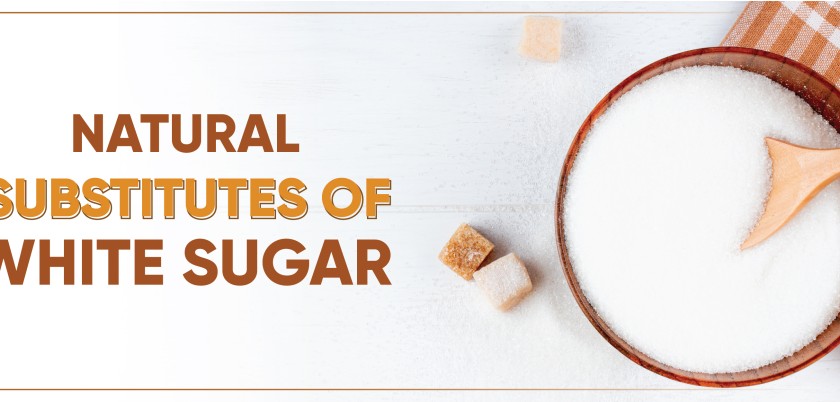
Natural substitutes of white sugar
Who doesn't crave sweet? Everyone loves to eat sweet foods like desserts, cakes, halwas etc. guilt free. Research has proven that one of the leading causes of the high rates of obesity is consumption of refined sugar and sugary beverages. Furthermore high sugar diets lead to various metabolic diseases such as heart diseases, fatty liver disease and diabetes. This is because added sugars increase the total calorie intake, adiposity and dyslipidemia. One teaspoon (5 grams) of refined sugars give roughly 20 kcal and it is all empty calories. There are various alternatives available in the market that either offer fewer calories, zero calories or provide same calories as refined sugars but with a few advantages.
1. Caloric sweeteners(A) Dates - Dried fruit of the date palm tree is called dates. These chewy and sweet fruits are an excellent alternative to refined sugar as they are loaded with nutrients such as potassium, fibre, magnesium, manganese, vitamin B6 and antioxidants such as polyphenols and carotenoids. Dates can be used as a thick paste to replace refined sugars or add them in cakes, desserts and cookies. Although they are also calorie sweetners, but their impact on blood sugar spikes is less as compared to refined sugars. This is attributed to its low glycemic index. Choose it wisely as it is calorie loaded.
(B) Applesauce or fruit purees - Bakery products such as cakes, cookies, muffins and breads can use purees of fruits such as banana or apple for replacing refined sugars. Unlike refined sugars which provide empty calories, fruits are full of nutrients and research has proven that fruit consumption reduces the risk of various metabolic diseases.
(C) Honey - This thick golden liquid produced by honey bees has various plant compounds such as polyphenols that possess antioxidant and anti inflammatory properties and honey also has certain vitamins and minerals. Also honey's glycemic index is slightly lower than white sugar, making it better alternative in all aspects. Also raw honey, that is honey derived from beehive, is the best as it is unprocessed, unheated and unpasteurised. But choose it in moderation as its still calorie dense.
(D) Maple syrup - This thick sugary liquid is made by cooking the sap of maple trees. It has various beneficial nutrients as well as antioxidants such as phenolic compounds (lignans and coumarins) which offer anti-inflammatory effects. But use this in limit because despite being slightly lower in glycemic index, it still has high sugar content.
(E) Molasses - Boiling sugarcane juice or beetroot juice gives a sweet brown liquid of syrup-consistency which is called mosses. They contain nutrients such as iron, potassium and calcium. Its a healthy alternative to sugars but is still calorie dense . The oligosaccharides present in maple syrup lowers the plasma glucose content in blood, thus being helpful for people with type 1 diabetes.
(F) Coconut / Palm sugar - It is extracted from the dap of palm tree. It has a slightly lower glycemic index than white sugar. Also being rich in iron, zinc, calcium and potassium, its a healthy alternative. It also possesses strong antioxidant properties. Be mindful for adding it in your dishes as it also has calories.
(G) Jaggery - One of the most inexpensive sweeteners is jaggery or gur. Boiling of sugarcane until it hardens and then chopping it into blocks results in the formation of jaggery. The best known nutrition fact about jaggery is its iron content due to its production in iron vessels.
2. Low calorie sweeteners
Sugar alcohols - These polyols are a type of carbohydrates occurring naturally in fruits and vegetables and are low calorie sweeteners. Substitute of sugar include xylitol, erythritol and maltitol. They provide roughly 2-4 kcal/g, whereas refined sugars provide 4 kcal/g. Research has shown that these are suitable for maintaining glucose balance in the body. Also these polyols are not fermented by the bacteria present in the mouth, so there is a very little reason for tooth decay, unlike refined sugars.
3. Non calorie sweeteners -
Stevia - Stevia is a natural plant based sweetener available in the market which is derived from a shrub Stevia rebaudiana. There are two components called glycosides (stevioside and rebaudioside A) in this plant from which stevia can be obtained. These compounds give zero calories, are 200-300 times sweeter than sugar and have a slightly different taste than refined sugar. Replacing sugars with stevia (a non-caloric sweetener) is a good measure to control blood sugar levels, blood pressure and weight gain.
Diets high in sugar impose various health implications. So replacing refined sugar with some healthy alternative is a good strategy for cutting down sugar intake.






